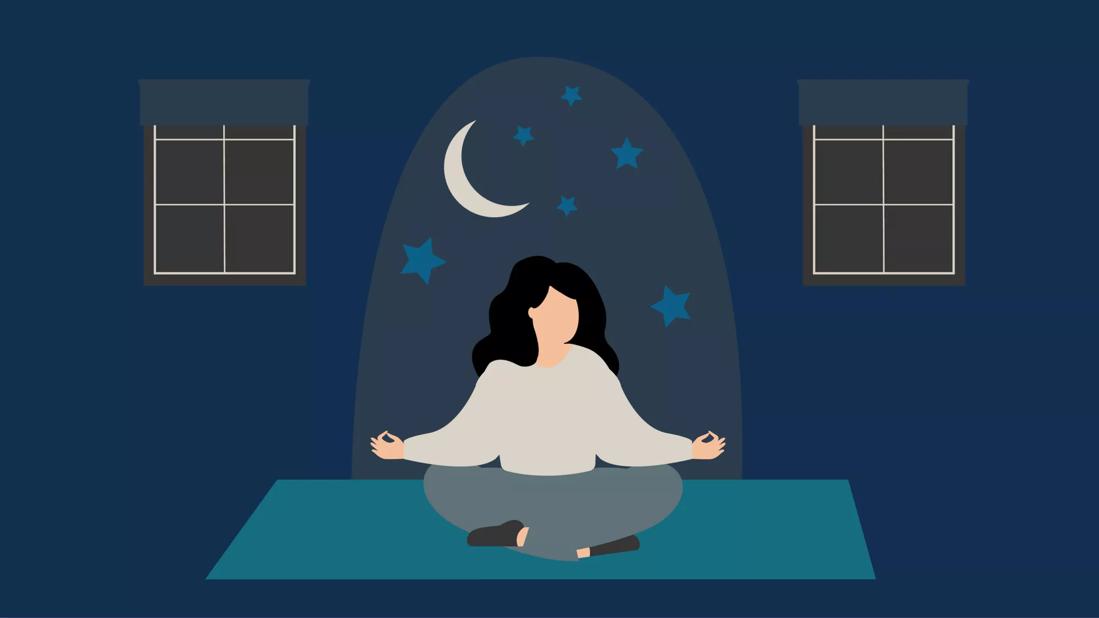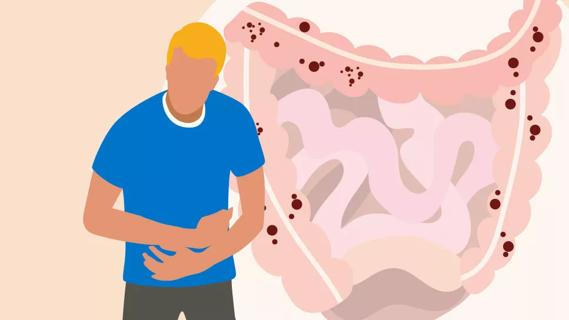Studies show a strong self-care regimen can improve symptoms and overall health

If you have Crohn’s disease, you know that many foods can trigger a flare-up and leave you experiencing abdominal pain, diarrhea and fatigue.
Advertisement
Cleveland Clinic is a non-profit academic medical center. Advertising on our site helps support our mission. We do not endorse non-Cleveland Clinic products or services. Policy
But there’s more to managing your condition than making smart food choices. You also need a self-care routine that makes managing your Crohn’s easier.
When we say “self-care,” we’re not talking about bubble baths and shopping sprees. We’re talking about scientifically supported lifestyle changes that improve your quality of life and make it easier to manage your condition. According to a 2016 study, people with Crohn’s see a reduction in symptoms — and better overall health — when they create and adhere to a self-management plan.
“An informed patient is the best patient,” says colorectal surgeon Stefan Holubar, MD. “They stand the best chance of better overall outcomes with the disease.”
We’ve compiled a list of self-care suggestions for navigating life with Crohn’s disease. The more you know about the factors influencing your condition, the easier it can be to decide what lifestyle changes you are (and aren’t) going to make to improve your symptoms.
Dr. Holubar offers eight recommendations for managing your Crohn’s disease. With careful management, you may find that you experience fewer symptoms and flare-ups.
Vitamin deficiencies that come with Crohn’s may make some supplements (like vitamins D and B12 and folic acid, for instance) helpful.
Advertisement
But other supplements can actually make your condition worse. St. John’s wort, for example, can increase upset stomach, nausea and vomiting. Black cohosh can cause liver problems.
Dr. Holubar recommends talking to your healthcare provider before you start using any herbs or supplements. Only your provider can tell you how these products will interact with the prescription medications you’re taking.
"If you are having surgery for Crohn’s, make sure to let the anesthesiologist know what supplements you are taking,” Dr. Holubar adds.
You know smoking is bad for your health in general, but it can also really wreak havoc when you have Crohn’s disease, says Dr. Holubar.
It doesn’t matter what you smoke, because nicotine is the culprit. Cigarettes, cigars and even vaping can promote inflammation and put you at greater risk for a relapse. Lighting up could also mean you’ll need to take more medications or need more surgeries to manage your condition.
“Smoking also increases the risk that comes with surgery,” Dr. Holubar notes. “Quitting smoking isn’t easy, so ask your doctor for options to help— but the impact it will have on your condition will make that hard work worthwhile.”
Of course, it’s your choice if you want to have an occasional cocktail or glass of wine on special occasions. But keep in mind that alcohol might interact negatively with the medications you take to manage your condition.
“Crohn’s disease irritates your intestinal lining — and excess alcohol can also aggravate it further. If your intestines are inflamed, you increase the likelihood of bleeding, malnutrition and worsening symptoms overall,” Dr. Holubar explains.
Drinking alcohol in moderation is likely not harmful, but each person’s threshold for irritation is different. If you decide to test your limits, be prepared for the possibility of a nasty flare.
Side note: If you struggle with alcohol use disorder, share that information with your provider. That may influence the kinds of medications they prescribe. They can also discuss addiction treatment and harm-reduction strategies with you and connect you to resources when you’re ready.
Maintaining your health by preventing infections is a critical part of living with Crohn’s, so don’t pass up the vaccinations your provider recommends. Vaccines pose very little risk.
“The data have been very strongly in favor of vaccinating,” Dr. Holubar shares. “Generally, the recommendation is to avoid live vaccines when you’re immunosuppressed, but the number of live vaccines has declined over the years. We also have a ‘dead’ vaccine alternative for most of the major illnesses we vaccinate against.”
Advertisement
Crohn’s leaves you more vulnerable to flu and pneumonia, so it’s especially important to get the influenza and pneumococcal vaccines.
And, if your provider recommends that you take tofacitinib, discuss getting the zoster vaccine (Shingrix®) as well, Dr. Holubar advises.
Discuss all vaccines and their possible side effects with your physician.
If you’re thinking about starting a family, it’s also important to discuss it with your gastroenterologist and colorectal surgeon. They can identify the best strategy for 1) addressing any fertility issues you might have as a result of irritable bowel disease (IBD) and 2) treating your Crohn’s disease during pregnancy.
“Data suggest that active Crohn’s disease is the most dangerous thing for a baby — not the medications we use to treat it,” Dr. Holubar clarifies. “So, always include your doctor in the conversation and make sure everyone is on the same page.”
Most importantly, work closely with your healthcare provider to make sure you fully understand your treatment options, as well as which behaviors are most likely to make your Crohn’s worse.
When you’re anxious or stressed out, it directly impacts the severity of your symptoms, Dr. Holubar explains. That’s probably not a surprise. People living with Crohn’s know all too well that mental health and IBD — the brain and the gut — are inextricably linked. So much so that they can create a negative feedback loop: Mental health issues trigger a Crohn’s flare, which increases anxiety and depression, which triggers another flare … you get the idea.
Advertisement
“To be clear,” Dr. Holubar emphasizes, “anxiety does not cause Crohn’s disease. But once you have Crohn’s, anxiety can make it worse.”
The good news here is that the gut-brain connection could also create a positive feedback loop. A 2020 study published in Nature found that participating in mindfulness-based therapies can actually improve inflammatory biomarkers. A few select examples of mindfulness-based therapies used for Crohn’s management include breathing exercises, meditation and body-scanning practices. If none of those practices appeal to you, fear not: There are a lot more where that came from.
Mindfulness is an important piece of the Crohn’s management puzzle, but it’s critical to recognize its limits. If you notice that you’re struggling, tell your gastroenterologist. They can refer you to mental health providers with experience treating people living with IBD.
Another way you can minimize the effects of stress is by practicing good sleep hygiene. Most adults need somewhere between seven and nine hours of sleep a night, but few of us actually get it.
You might not be able to change your ever-fluctuating work schedule, or exchange your toddler for a night terrors-free model, but you can do the following:
Advertisement
Dr. Holubar recommends getting as much exercise as your body allows.
That last part is important. You need to listen to your body. If you’re dealing with symptoms like cramping, abdominal pain, bloating or fever, give yourself permission to rest. And when you feel well again, take advantage of the opportunity to get moving.
What “get moving” means will likely change over time. The kind of exercise you can do while in remission or a mild disease state is often different from what you can (or should) do during a flare.
“It’s a good idea to discuss appropriate physical activity with your doctor,” Dr. Holubar advises. The conventional wisdom is that low- and moderate-intensity physical activity are best because more strenuous activity can speed up your gastrointestinal motility.
Whatever kind of exercise you choose to do, keep your symptoms in mind. In other words:
And one more thing: Take fatigue seriously. Yes, exercise can be exhausting. But you should feel at least somewhat energized while you’re working out. If you notice that your fatigue is getting worse the more you do, heed the warning your body’s sending. Responding to your body’s cues doesn’t make you lazy — it makes you savvy.
Being diagnosed with Crohn’s disease can be an upsetting experience. There’s no known cure and it often requires big changes to your daily life — not to mention more doctor’s visits.
But there’s good news: Learning Crohn’s self-management skills can bring positive changes to more than just your condition. Learning to prioritize your health could reduce your symptoms, your likelihood of experiencing a flare and the severity of any flares that do happen. It could even help you get and stay in remission. It can also mean getting into better shape, feeling less stressed and enjoying better overall health and quality of life.
Small changes can add up, so do what you can and celebrate every little win.
Learn more about our editorial process.
Advertisement

If you have IBD, there are roughly nine food types that might contribute to inflammation flare-ups

The caffeine and natural acids in coffee may trigger acid reflux, but there are ways to lessen the effects

Exploring your hidden side can lead to better understanding of what makes you tick

Wait a few hours, then start with water or ice chips, graduating to clear liquids and then, soft, bland foods

Eating a healthy diet, reducing stress, and focusing on exercise and sleep can help keep your digestive system in top form

People with an inflamed esophagus may also have other conditions that cause a nagging, persistent cough

Mindful eating, physical activity and quality sleep are just a few ways to protect your kidney function

Building a support system, adapting activities you love and following a healthy diet can all help manage symptoms and changes

The tropical fruit is a good source of antioxidants and vitamin C

Most people fall asleep within 10 to 20 minutes, but if your experience is different, adjusting your sleep schedule may help

Exploring your hidden side can lead to better understanding of what makes you tick